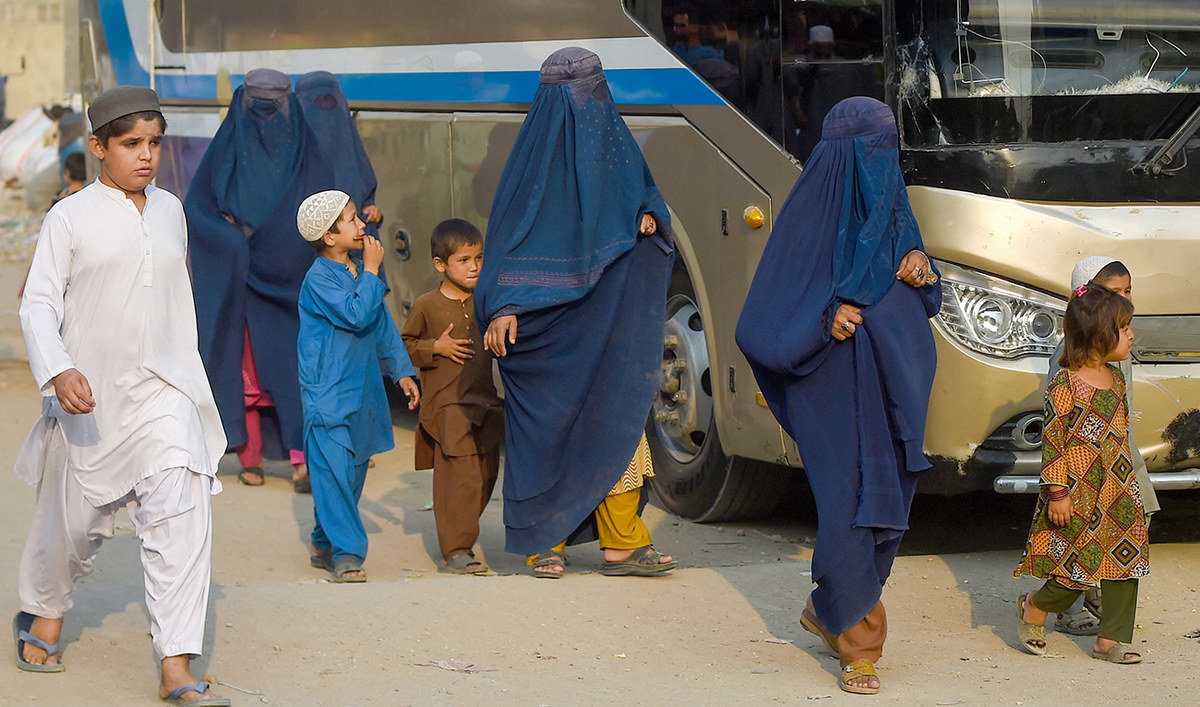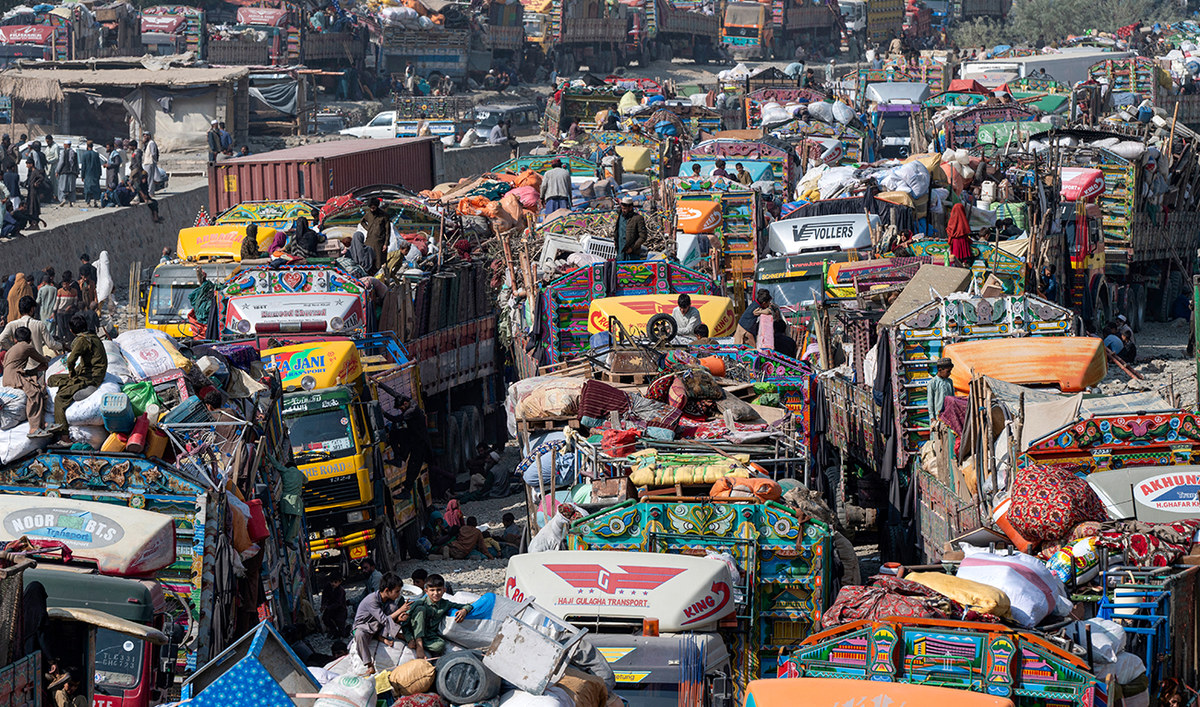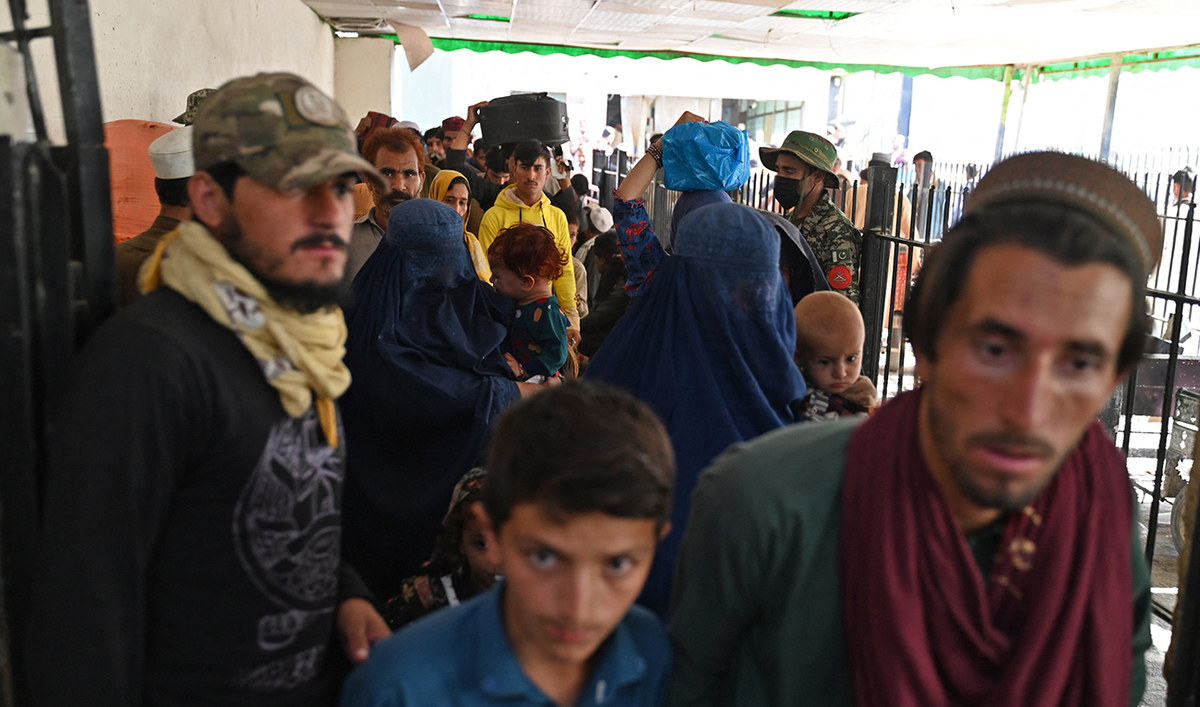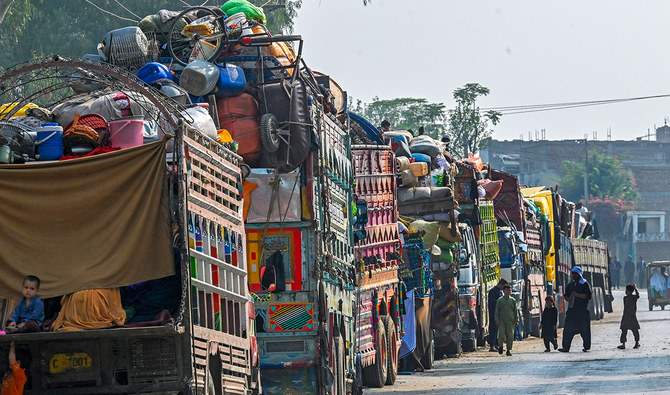KARACHI: Prime Minister Anwaar-ul-Haq Kakar said on Tuesday there was no “perpetual ban” on the return to Pakistan of undocumented Afghans ordered to leave the country by Nov. 1 or face forcible expulsion.
Pakistan on Oct. 3 gave all illegal migrants in the country around four weeks to leave. Although the government insists the expulsion order does not specifically target Afghans, they form the largest number of undocumented foreigners in the South Asian nation. Pakistan is home to more than 4 million Afghan migrants and refugees, about 1.7 million of them undocumented, according to the government. Many of them have lived in Pakistan their entire lives and never visited Afghanistan.
The sudden expulsion threat came after suicide bombings this year that the government said involved Afghans, though without providing evidence.
Islamabad has also blamed Afghans for smuggling and other militant attacks as well as petty crimes and says Afghan nationals were found to be involved in attacks against government and the army, including 14 of this year’s 24 suicide bombings.

Afghan refugees arrive at the Karachi bus terminal in Sindh province, to depart for Afghanistan on October 30, 2023. (AFP)
The government says those with Proof of Registration (PoR) and Afghan Citizenship Cards (ACC) will not be expelled by the Nov. 1 deadline.
“We haven’t placed a perpetual ban on them [illegal foreigners], preventing them from returning to Pakistan,” Kakar told media on Tuesday. “They should go back to their home countries, obtain travel documents from their states, and acquire visas from our missions, whether for education or business purposes.”
“We want a regulated movement, we are against unregulated movement,” the PM added, saying immigrants who had legal properties and lawful businesses in Pakistan could claim them through civil courts.
“If anyone has such claims, we will protect and facilitate their entitlement under the law. We are not an oppressive state that seizes anyone’s property or confiscates their valuables.”

Afghan refugees depart for Afghanistan from the Karachi bus terminal in Sindh province on October 30, 2023. (AFP)
Sarfaraz Bugti, the federal interior minister, said the government would launch a crackdown against “illegal aliens” from Nov 2.
“From November 2 onwards, they will be sent to our holding centers. We will keep them at the holding centers for two to three days. We will try to provide them with food and health facilities and after that we will deport them through the border of our choice which will be in keeping with our security [requirements] and convenience,” Bugti said.
“It will be the state’s decision whether it wants to send them through Chaman or Torkham or Nushki [border crossings] or the Iranian border, that will be our choice.”
Jan Achakzai, information minister in southwestern Balochistan which borders Afghanistan, said a crackdown would be launched in the province from tomorrow, Wednesday, against illegal immigrants who did not leave by the Nov. 1 deadline.

Afghan refugees arrive in trucks from Pakistan at the Afghanistan-Pakistan Torkham border in Nangarhar province on October 30, 2023. (AFP)
“Cases against illegal immigrants will be registered under the Foreign Act. The properties of illegal immigrants will be sealed from tomorrow,” Achakzai said at a press conference.
According to the UN Refugee Agency (UNHCR), Pakistan is hosting 1.33 million registered Afghan refugees and 840,000 Afghan nationals who possess Afghan Citizen Cards (ACC). Pakistan says these two groups are not being sent back as per its international obligations.
Additionally, the UN agency reports 775,000 undocumented Afghans, 146,240 unregistered members of registered families, and 600,000 new arrivals after the Taliban takeover of Kabul in 2021 are currently living in Pakistan.
The government of Pakistan says undocumented illegal Afghan nationals number 1.7 million.
Officials in the Khyber Pakhtunkhwa and Balochistan provinces, which border Afghanistan, say 130,000 people have voluntarily returned to Afghanistan since the Nov. 1 deadline was announced earlier this month.
Two holding centers have been set up in Balochistan and three in Khyber Pakhunkhwa to accommodate immigrants before their deportation, officials in the two provinces said.
Speaking to Arab News, Brig. (R) Harris Nawaz, home minister of the southern SIndh province, said four holding centers had been setup in Jacobabad, Nawab Shah, Hyderabad and Karachi, where shelter, food and health facilities would be provided.

In this photo taken on October 30, 2023, Afghan refugees walk inside a fenced corridor after arriving from Pakistan at the Afghanistan-Pakistan Torkham border in Nangarhar province. (AFP)
“They [Afghans] will be taken to camps, verified, and then deported,” Nawaz said, adding that illegal immigrants would not be arrested and no cases would be registered against them.
On Tuesday, Western embassies and the United Nations urged Pakistan to incorporate into its plan to deport hundreds of thousands of undocumented migrants a way to identify and protect Afghans who face the risk of persecution at home.
“We are asking the government to come up with a comprehensive system and ... mechanism to manage and register people at immediate risk of persecution if forced to return,” Qaiser Khan Afridi, the spokesman for the UN refugee agency in Pakistan, told Reuters.
“Because they cannot return, they can’t go back to Afghanistan because their freedom or their life might be at risk.”
US envoy to Pakistan Donald Blome also met Pakistani Foreign Minister Jalil Abbas Jilani on Tuesday, the ambassador’s office said, and discussed, among other issues, the “safe and efficient processing of Afghan citizens eligible for relocation or resettlement in the United States.”
“The [US] Ambassador highlighted the two countries’ mutual interest in ensuring the safety and security of refugees and asylum seekers, and the importance of putting in place appropriate screening mechanisms so that individuals with legitimate claims of credible fear are not placed in harm’s way.”












